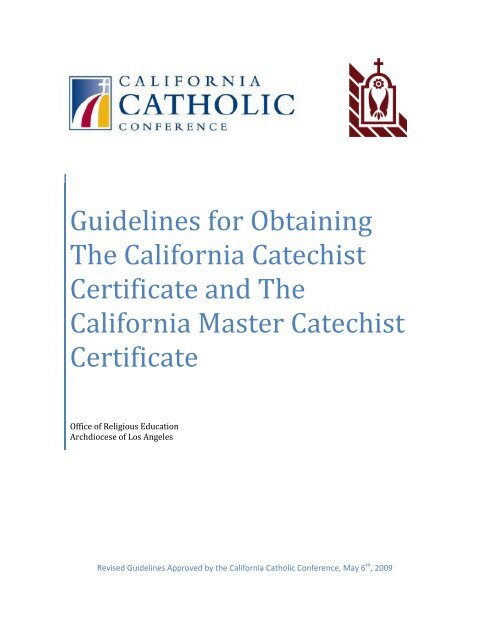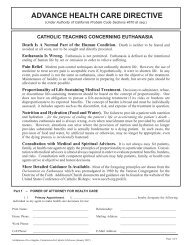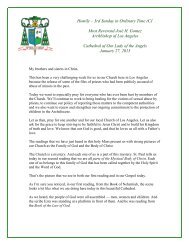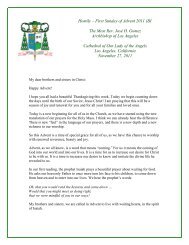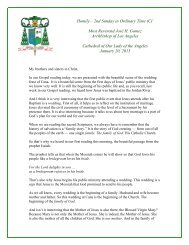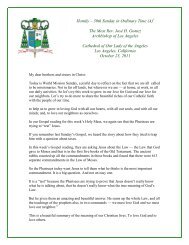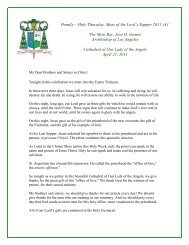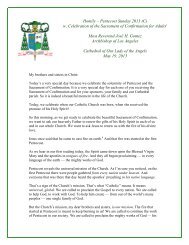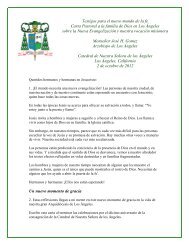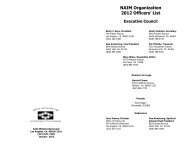LA Diocese Catechist guideline.pdf
LA Diocese Catechist guideline.pdf
LA Diocese Catechist guideline.pdf
You also want an ePaper? Increase the reach of your titles
YUMPU automatically turns print PDFs into web optimized ePapers that Google loves.
Guidelines for Obtaining<br />
The California <strong>Catechist</strong><br />
Certificate and The<br />
California Master <strong>Catechist</strong><br />
Certificate<br />
Office of Religious Education<br />
Archdiocese of Los Angeles<br />
Revised Guidelines Approved by the California Catholic Conference, May 6 th , 2009
- 2 -<br />
[This page intentionally left blank]
- 3 -
- 4 -<br />
[This page intentionally left blank]
“Go therefore and make disciples of all nations.”<br />
Matthew 28:19<br />
Guidelines for Obtaining<br />
The California <strong>Catechist</strong> Certificate<br />
and<br />
The California Master <strong>Catechist</strong><br />
Certificate<br />
Purpose of the Guidelines<br />
In order to promote effective catechesis and standardize the quality of the formation of<br />
catechists under their jurisdiction, the Bishops of the California Catholic Conference, in<br />
consultation with the Directors of Catechetical Ministry, the Superintendents of Catholic<br />
Schools, the Directors of Youth Ministry and the Directors of Adult Faith Formation of the<br />
<strong>Diocese</strong>s of the State of California, have agreed upon the following revised Guidelines for the<br />
Formation and Certification of <strong>Catechist</strong>s and Master <strong>Catechist</strong>s.<br />
These Guidelines outline the process and standards whereby a catechist can gain or renew the<br />
California <strong>Catechist</strong> Certificate or an experienced catechist can gain or renew the California<br />
Master <strong>Catechist</strong> Certificate.<br />
Catechetical Ministry and the Mission of the Church<br />
“Go therefore, and make disciples of all nations, baptizing them in the<br />
name of the Father, and of the Son and of the Holy Spirit, teaching them<br />
to observe all that I have commanded you. And behold, I am with you<br />
always, until the end of the age.” Matthew 28:19-20<br />
“Go therefore, and make disciples” clearly calls for the formation of catechists who will<br />
proclaim the Gospel message in such a way that it may take root in those being catechized and<br />
foster conversion to the person and message of Jesus Christ. The post modern context<br />
- 5 -
culturally, socially, and technologically, of the US in the 21 st century, in which this process takes<br />
place, impacts the condition for the reception of the Gospel and a response to it.<br />
The following key catechetical criteria must be upheld to help bring the transforming power of<br />
the Gospel to touch persons in their hearts and cultures at their deepest levels:<br />
<br />
<br />
<br />
That the same Gospel message that was given by Jesus Christ in its integrity,<br />
authenticity, and purity be preserved in the cultural environment in which it is<br />
presented. [NDC, p. 82]<br />
That “The baptismal catechumenate be the source of inspiration for all catechesis”<br />
[NDC, p. 115]<br />
That Adult catechesis be the organizing principle by which coherence is given to the<br />
various catechetical programs offered by a particular church. Adult Catechesis “is the<br />
axis around which revolves the catechesis of childhood and adolescence as well as that<br />
of old age” *GDC, no. 275+<br />
The General Directory for Catechesis (hereafter GDC) and the National Directory for Catechesis<br />
(hereafter NDC) contextualize the whole of catechesis within the process of evangelization,<br />
calling catechesis an essential moment in the evangelization process. [GDC, nos. 85-86; NDC,<br />
pp. 59-62]<br />
The NDC delineates the inclusion of the following six interrelated tasks for the development of<br />
full Christian faith:<br />
1) to deepen knowledge of faith;<br />
2) to provide a liturgical education that brings the faithful to full, conscious, and active<br />
participation in liturgy;<br />
3) to provide a moral formation that transmits Jesus’ attitudes to the faithful in a way that<br />
leads to interior transformation;<br />
4) to teach people to pray in such a way that catechesis is permeated by a climate of<br />
prayer;<br />
5) to prepare the Christian to live in community;<br />
6) to prepare Christians to participate actively in the life and mission of the Church [GDC,<br />
nos. 85-86; NDC, pp.59-62]<br />
Catechesis needs to include all of these interdependent elements for the Christian faith to<br />
attain full development.<br />
Formation, Certification and Commissioning<br />
“The call to the ministry of catechist is a vocation, an interior call, the voice of the Holy Spirit”<br />
[NDC, p. 228] and is discerned within the community. To be truly effective, catechists should be<br />
appropriately formed, prepared and certified for this important ministry which carries out the<br />
- 6 -
teaching mission of the Church. Since those seeking to be catechists have varying levels of<br />
experience and catechetical competence, catechetical formation programs should “help them<br />
acquire the knowledge and skills they need to hand on the faith to those entrusted to their care<br />
and assist them in living as disciples in Christ” *NDC, p. 235+. Persons serving as catechists, both<br />
experienced and newly invited, should be commissioned in a ceremony that “expresses the<br />
Church’s call, recognizes the catechist’s generous response, and confidently sends the catechist<br />
out to proclaim the Gospel of Jesus Christ” *NDC, p. 236+.<br />
Diocesan Responsibility<br />
Under the direction of the local Bishop, who is specifically responsible for the transmission of<br />
the Faith in the particular Church entrusted to him several diocesan offices share responsibility<br />
for the diocesan catechetical mission. The diocesan catechetical office is chief among these in<br />
bringing leadership. [NDC, pgs. 215; 250; GDC, no. 265].<br />
Each diocese, recognizing its individual needs and resources, has the responsibility to establish<br />
its own process to prepare and form catechists. When the diocesan formation process includes<br />
the standards outlined in this document, the diocese may issue the state-recognized<br />
certificates, i.e., the California <strong>Catechist</strong> Certificate and the California Master <strong>Catechist</strong><br />
Certificate. All dioceses in California recognize the validity of these two certificates.<br />
The Mission of <strong>Catechist</strong>s in the Life of the Parish, the Family and the<br />
Catholic School<br />
The mission of catechists is to “exemplify the manner in which we cooperate with God’s grace<br />
to ensure the growth of faith and remind us that it is God who causes the growth” *NDC, p.<br />
217+. The catechist “is God’s instrument in the mission to ‘make disciples of all nations’” *NDC,<br />
p. 243].<br />
“The parish is ‘the primary experience of the Church’ for most Catholics. It is where the faithful<br />
gather for the celebration of the sacraments and the proclamation of the word of God, and<br />
where they are enabled to live distinctively Christian lives of charity and service in their family,<br />
economic, and civic situations. It is the living and permanent environment for growth in the<br />
faith’” *NDC, p. 254+. The parish provides a variety of models, settings, for nourishing growth in<br />
faith for adults, youth, young adults, and children.<br />
- 7 -
Within the life of the family “parents are the primary educators in the faith” *GDC, no. 255+.<br />
“They have a unique responsibility for the education of their children; they are the first<br />
educators or catechists. They catechize primarily by the witness of their Christian lives and by<br />
their love for the faith” *NDC, p. 234+.<br />
Within Catholic schools “the distinctive Catholic identity and mission…depend on the efforts<br />
and example of the whole faculty” *NDC, p. 233+. “All the members of the faculty, at least by<br />
their example, are an integral part of the process of religious education” *NDC, p. 233+.<br />
Regardless of catechetical setting or environment, “catechesis is the responsibility of the entire<br />
Christian community” *GDC, no. 220+ and “not only brings to maturity the faith of those being<br />
catechized but also brings the community itself to maturity” *GDC, no. 221+.<br />
Personal Qualities of a <strong>Catechist</strong><br />
The Church calls forth exemplary followers of Christ who have a living, conscious, active<br />
participation in the sacramental life of the Church. Personal qualities of catechists should<br />
include:<br />
• faith that manifests itself in their piety and daily life;<br />
• love for the Church;<br />
• apostolic spirit and missionary zeal;<br />
• love for their brothers and sisters and a desire to give generous service;<br />
• a willingness to continue their own religious education and formation;<br />
• the human, moral, and technical qualities necessary for the ministry of a catechist such<br />
as dynamism and good relationships with others;<br />
• respect for the diversity of cultures;<br />
• an ability to appreciate different stages of individual growth and development;<br />
• an ability to communicate effectively with the persons to be catechized.<br />
These general qualities will have to be made more specific for local conditions and applied to<br />
the particular circumstances in each area [see NDC, p. 236].<br />
Selection and Formation of <strong>Catechist</strong>s<br />
It is an important task of parish catechetical leadership to discern who has the gifts, talents and<br />
abilities to be a catechist. “The suggestion that anyone can be a catechist should be<br />
scrupulously avoided in all communication involving the recruitment of catechists” *NDC, p.<br />
236].<br />
- 8 -
The pastor and catechetical leadership in each parish and school have the duty to:<br />
• call forth practicing Catholics who participate fully in the communal worship and life of<br />
the Church;<br />
• assist potential candidates in discerning their vocation to become faith-filled and<br />
dynamic catechists;<br />
• screen and train candidates in accord with the Charter for the Protection of Children and<br />
Young People and diocesan policies for safe environments;<br />
• require candidates to complete formation programs for catechist certification as<br />
sponsored/developed by the diocese within the time period specified by the diocese;<br />
• select, orient, commission, supervise and evaluate catechists — both those in the<br />
process of obtaining certification and those renewing certification;<br />
• provide catechists with ongoing opportunities for continued personal, spiritual and<br />
professional formation and development annually.<br />
The National Directory for Catechesis asserts that catechists should be known by the<br />
catechetical leadership, should be invited to ministry and should receive initial and ongoing<br />
formation. [NDC, pp. 236-237] This formation should conform to the following standards.<br />
Standards for the California <strong>Catechist</strong> Certification<br />
<strong>Catechist</strong> Formation Course<br />
CONTENT<br />
A. Course of Studies to Obtain a California <strong>Catechist</strong> Certificate<br />
The course of studies is consistent with the General Directory for Catechesis, National Directory<br />
for Catechesis, Catechism of the Catholic Church, United States Catholic Catechism for Adults,<br />
Co-Workers in the Vineyard and Our Hearts Were Burning Within Us.<br />
I. Tasks of Catechesis<br />
a) Knowledge of the Faith<br />
• Revelation/Faith<br />
• Scripture<br />
• Tradition<br />
• The Creed<br />
• Trinity and the Image of God<br />
- 9 -
• Christology<br />
• Ecclesiology<br />
• Mary and the Saints<br />
• Life Everlasting<br />
b) Liturgical Life<br />
• The Paschal Mystery<br />
• Sacramental Theology<br />
• Liturgy<br />
• Eucharist as Source and Summit<br />
• Sacraments of Initiation<br />
• Sacraments of Healing<br />
• Sacraments at the Service of Communion<br />
c) Moral Formation<br />
• Dignity of the Human Person<br />
• Sin, Grace, Redemption<br />
• Ten Commandments, the Great Commandment, the Beatitudes<br />
• Moral Principles<br />
• Conscience Formation, Moral Decision Making<br />
• Virtue and Gospel Values<br />
• Catholic Social Teaching<br />
• Life Long Conversion<br />
d) Christian Prayer<br />
• Prayer in the Christian Life<br />
• Spirituality<br />
• Prayer Forms<br />
• The Lord’s Prayer<br />
• Leading Prayer<br />
- 10 -
e) Communal Life<br />
• Communal Character of Life in Christ - Households of Faith, Parish Communities<br />
• Apprenticeship in Christian Living<br />
• Ecumenical Dimension<br />
• Multicultural Reality<br />
• Safe Environments<br />
f) Missionary Spirit<br />
• Evangelizing Spirit, New Evangelization<br />
• Discipleship<br />
• Call of Laity in Mission and Service in the World<br />
• Interreligious Dialogue<br />
II. Nature and Purpose of Catechesis<br />
a) Initiating and Ongoing Catechesis<br />
b) Catechumenate as Model and Inspiration<br />
c) Evangelizing Catechesis<br />
d) Inculturation<br />
e) Faith and Human Development<br />
f) Authentic Presentation of Christian Message<br />
g) History of Catechesis<br />
III. Methodology<br />
a) Divine Methodology<br />
b) Elements of Human Methodology<br />
c) Learning Styles, Teaching Styles<br />
d) Technology and Catechesis<br />
e) Resources<br />
f) Lesson planning<br />
- 11 -
IV. Catechizing the People of God in Diverse Settings<br />
Certification for specialized areas should include a comprehensive course of formation and<br />
instruction in the above-mentioned content areas as well as formation pertinent to that<br />
particular specialization. This includes:<br />
A. That the catechist “must take into consideration all the human factors of a particular<br />
age level in order to present the Gospel message in a vital and compelling way” *NDC, p.<br />
187].<br />
B. That skills training for particular catechetical areas such as: whole community<br />
catechesis, adult catechesis, the elderly, young adults, adolescent catechesis,<br />
comprehensive youth ministry, family catechesis, elementary, early childhood, and<br />
catechesis for those with special needs. Skills training may also focus on areas such as<br />
RCIA, Scripture study, Infant Baptism, Restorative Justice, specific cultural groups, lifelong<br />
faith formation.<br />
V. Spiritual Development of the <strong>Catechist</strong><br />
“Spiritual formation aims to arouse and animate true hunger for holiness, desire for union with<br />
the Father through Christ in the Spirit, daily growing in love of God and neighbor in life and<br />
ministry, and the practices of prayer and spirituality that foster these attitudes and dispositions.<br />
It promotes and strengthens that fundamental conversion that places God, and not oneself, at<br />
the center of one’s life” *Co-Workers in the Vineyard of the Lord, p.38].<br />
“Every theme covered by formation should feed, in the first place, the faith of the catechist”<br />
[GDC, no. 239].<br />
The integration of the following methods of spiritual formation:<br />
• A Theology of Ministry to include nourishment of the vocation of <strong>Catechist</strong><br />
• Prayer (to include retreats and days of reflection) and spiritual practices<br />
• Spiritual guidance<br />
• Faith sharing and theological reflection<br />
• Practice of justice and charity<br />
• Celebration of liturgical life<br />
- 12 -
PROCESS<br />
B. California <strong>Catechist</strong> Certification<br />
A catechist will receive California <strong>Catechist</strong> Certification from the <strong>Diocese</strong> upon:<br />
1. Satisfactory completion of the California <strong>Catechist</strong> program of formation and study as<br />
identified in Section A (above);<br />
2. One year of catechetical experience;<br />
3. Evaluation of the candidate’s performance, by a Master <strong>Catechist</strong> / or experienced<br />
certified <strong>Catechist</strong>. including at least one observation and evaluation of the catechist in<br />
a catechetical session.<br />
C. Expiration and Renewal<br />
The California <strong>Catechist</strong> Certification expires in no less than three (3) years and no more than<br />
four (4) years after the date of issue. To renew this certificate, the catechist shall complete at<br />
The California <strong>Catechist</strong> Certificate least ten (10) hours annually in the content areas delineated<br />
in Section A (above) during the life of the certificate. Courses should have the prior approval of<br />
the diocesan office. The catechist must demonstrate on-going catechetical formation in<br />
accordance with diocesan requirements.<br />
D. Alternative Methods to Obtain a California <strong>Catechist</strong> Certificate<br />
Each diocese may establish alternative methods to obtain a <strong>Catechist</strong> Certificate. Some basic<br />
qualifications for eligibility include:<br />
1. Completion within the last 5 years of a Degree or Certificate Program in Religious<br />
Studies, Catechesis or Theology, from a Catholic college, university, School of Ministry,<br />
that reflects knowledge in the content areas delineated in section A-1 through V plus B<br />
above and proven experience in catechesis.<br />
2. A current <strong>Catechist</strong> Certificate from a diocese outside of California with evidence of ongoing<br />
professional development and proven experience in Catechesis.<br />
3. Connection with local Diocesan Catechetical Office so as to become familiar with and<br />
participate in local formation programs.<br />
- 13 -
E. Reciprocity<br />
All dioceses in California recognize the validity of the California <strong>Catechist</strong> Certificate issued by<br />
other dioceses in California that comply with these Guidelines.<br />
The Mission of Master <strong>Catechist</strong>s in the Life of the <strong>Diocese</strong><br />
Master <strong>Catechist</strong>s, as extensions of the teaching office of the Bishop, are selected and<br />
commissioned to:<br />
A. Provide the specific formation and courses of studies and evaluations required by the<br />
diocese for catechists to obtain or renew a California <strong>Catechist</strong> Certificate;<br />
B. Provide workshops and in-services for the continued growth and formation of catechists<br />
and Catholic School teachers;<br />
C. To be willing to participate as a member of a catechetical leadership visioning team.<br />
Qualifications of a Master <strong>Catechist</strong><br />
In addition to the “Personal Qualities of a <strong>Catechist</strong>,” (pg. 5) the Master <strong>Catechist</strong> should have:<br />
A. A current California <strong>Catechist</strong> Certificate;<br />
B. Proven expertise and recent experience in catechetical ministry at various age levels;<br />
C. An ability to communicate and work effectively with adult learners in a formation<br />
setting;<br />
D. The personal recommendation of the candidate’s pastor or other catechetical leader;<br />
E. Evidence of ongoing education in: Theology, Catechesis, the teachings of the Church and<br />
Spiritual Development in light of Vatican II and post-conciliar documents.<br />
F. Evidence of the ability to work in multi-cultural situations;<br />
G. An understanding of the purpose of the Master <strong>Catechist</strong> and a willingness to serve as<br />
such when certified;<br />
H. An ability to study at an advanced level.<br />
The Selection and Formation of Master <strong>Catechist</strong>s<br />
The Bishop and/or his catechetical staff have the duty to:<br />
- 14 -
A. Call forth practicing Catholics who participate fully in the communal worship and life of<br />
the Church;<br />
B. Select candidates and evaluate their potential to become Master <strong>Catechist</strong>s;<br />
C. Certify candidates upon completion of the entire formation program for the Master<br />
<strong>Catechist</strong>;<br />
D. Orient, commission, supervise and evaluate Master <strong>Catechist</strong>s;<br />
E. Provide Master <strong>Catechist</strong>s with opportunities for continued personal, spiritual and<br />
professional development [NDC pg.249].<br />
Standards for California Master <strong>Catechist</strong> Certification<br />
CONTENT<br />
The Master <strong>Catechist</strong> pursues an in-depth study of the same content offered in the <strong>Catechist</strong><br />
formation course.<br />
A. Course of Studies to Obtain a California Master <strong>Catechist</strong> Certificate<br />
The course of studies is consistent with the General Directory for Catechesis, National Directory<br />
for Catechesis, Catechism of the Catholic Church, United States Catholic Catechism for Adults,<br />
Co-Workers in the Vineyard, Renewing the Vision, and Our Hearts Were Burning Within Us.<br />
I. Tasks of Catechesis<br />
a) Knowledge of the Faith<br />
• Revelation/Faith<br />
• Scripture<br />
• Tradition<br />
• The Creed<br />
• Trinity and the Image of God<br />
• Christology<br />
• Ecclesiology<br />
• Mary and the Saints<br />
• Life Everlasting<br />
- 15 -
) Liturgical Life<br />
• The Paschal Mystery<br />
• Sacramental Theology<br />
• Liturgy<br />
• Eucharist as Source and Summit<br />
• Sacraments of Initiation<br />
• Sacraments of Healing<br />
• Sacraments at the Service of Communion<br />
c) Moral Formation<br />
• Dignity of the Human Person<br />
• Sin, Grace, Redemption<br />
• Ten Commandments, the Great Commandment, the Beatitudes<br />
• Moral Principles<br />
• Conscience Formation, Moral Decision Making<br />
• Virtue and Gospel Values<br />
• Catholic Social Teaching<br />
• Life Long Conversion<br />
d) Christian Prayer<br />
• Prayer in the Christian Life<br />
• Spirituality<br />
• Prayer Forms<br />
• The Lord’s Prayer<br />
• Leading Prayer<br />
e) Communal Life<br />
• Communal Character of Life in Christ - Households of Faith, Parish Communities<br />
• Apprenticeship in Christian Living<br />
• Ecumenical Dimension<br />
• Multicultural Reality<br />
• Safe Environments<br />
- 16 -
f) Missionary Spirit<br />
• Evangelizing Spirit, New Evangelization<br />
• Discipleship<br />
• Call of Laity in Mission and Service in the World<br />
• Interreligious Dialogue<br />
II. Nature and Purpose of Catechesis<br />
a) Initiating and Ongoing Catechesis<br />
b) Catechumenate as Model and Inspiration<br />
c) Evangelizing Catechesis<br />
d) Inculturation<br />
e) Faith and Human Development<br />
f) Authentic Presentation of Christian Message<br />
g) History of Catechesis<br />
III. Methodology<br />
a) Divine Methodology<br />
b) Elements of Human Methodology<br />
c) Learning Styles, Teaching Styles<br />
d) Technology and Catechesis<br />
e) Resources<br />
IV. Additional Formation for Master <strong>Catechist</strong>s<br />
In addition to the formation and course of studies required to obtain a California <strong>Catechist</strong><br />
Certificate, the Master <strong>Catechist</strong> Course of study should include, but is not limited to the<br />
following:<br />
a) Teaching-learning process<br />
b) Effective teaching methods and skills<br />
c) How to recognize those with special needs<br />
d) Communication and public speaking skills<br />
e) Behavior management skills<br />
f) How to evaluate textbooks / Web based resources<br />
- 17 -
g) Goal-setting and supervision skills<br />
h) Thorough knowledge and use of the Catechism of the Catholic Church, the General<br />
Directory for Catechesis and the National Directory for Catechesis<br />
i) Curriculum development and adaptation<br />
j) Lesson planning<br />
k) Adult, youth, and child psychological and moral development<br />
l) Conflict management skills<br />
V. Spiritual Development of the Master <strong>Catechist</strong><br />
The course of study should include opportunities and direction in personal spiritual<br />
development by integrating the following spiritual formation practices:<br />
• Prayer (to include retreats and days of reflection) and spiritual practices<br />
• Spiritual guidance<br />
• Faith sharing and theological reflection<br />
• Practice of justice and charity<br />
• Celebration of liturgical life.<br />
PROCESS<br />
B. California Master <strong>Catechist</strong> Certification<br />
While there is no specific length of study required to obtain a Master <strong>Catechist</strong> Certificate, the<br />
Bishop and/or his catechetical staff shall develop specific, professional criteria and time-lines<br />
for awarding a Master <strong>Catechist</strong> Certificate. Completion of these criteria will be determined by<br />
means of:<br />
1. A review of the candidate’s application for Master <strong>Catechist</strong> Certification;<br />
2. An interview of the candidate;<br />
3. A review of the candidate’s continuing education and formation;<br />
4. The evaluation of the candidate’s supervised performance;<br />
5. On-going professional development and proven experience in catechesis<br />
- 18 -
C. Expiration and Renewal<br />
This certificate expires in no less than three (3) and no more than four (4) years after the date<br />
of issue. To renew this certificate, the Master <strong>Catechist</strong> must demonstrate on-going<br />
professional growth based upon his/her previous and current evaluations and serve as a<br />
presenter in the basic <strong>Catechist</strong> formation program as called upon.<br />
D. Alternative Methods to Obtain a California Master <strong>Catechist</strong> Certificate<br />
Each diocese may establish alternative methods to obtain a Master <strong>Catechist</strong> Certificate. Some<br />
basic qualifications for eligibility include:<br />
1. Completion within the last 5 years of a Masters Degree or Masters Certificate<br />
Program in Religious Studies, Catechesis or Theology, from a Catholic college or<br />
university, that reflects knowledge in the content areas delineated in section A-1<br />
through V plus B above and proven experience in catechesis with Adults.<br />
2. A current Master <strong>Catechist</strong> Certificate from a diocese outside of California with<br />
evidence of on-going professional development and proven experience in Catechesis<br />
with Adults.<br />
3. Connection with local Diocesan Catechetical Office so as to become familiar with<br />
and participate in local formation programs.<br />
Statewide Recognition of Certification<br />
The Bishops of California recognize the competency of each diocesan <strong>Catechist</strong> and Master<br />
<strong>Catechist</strong> program based on these <strong>guideline</strong>s. An authorized California certified <strong>Catechist</strong> or<br />
Master <strong>Catechist</strong> who moves from one diocese to another should participate in the local<br />
formation programs for the following reasons:<br />
1. By participating in the local programs, the <strong>Catechist</strong> becomes part of that<br />
catechetical community.<br />
2. The catechist becomes acquainted with the scope and direction of each program as<br />
designed to meet the particular needs of that diocese.<br />
3. The Diocesan staff can become acquainted with the person and the competencies of<br />
the <strong>Catechist</strong> or Master <strong>Catechist</strong>.<br />
- 19 -
Catechetical Documents<br />
Catechesi Tradendae (On Catechesis in Our Time), Pope John Paul II, 1979<br />
Catechism of the Catholic Church, 1992<br />
Christifideles Laici (Apostolic Exhortation on the Vocation and the Mission of the Lay Faithful in<br />
the Church and in the World), Pope John Paul II, 1988<br />
Co Workers in the Vineyard, USCCB, 2006<br />
Dei Verbum (On Divine Revelation), Vatican II, 1965<br />
Encuentro and Mission: A Renewed Pastoral Framework for Hispanic Ministry, USCCB, 2002<br />
Evangeli Nuntiandi (Evangelization in the Modern World), Pope Paul VI, 1975<br />
Gaudium et Spes (Pastoral Constitution on the Church in the Modern World), Vatican II, 1965<br />
General Directory for Catechesis, Sacred Congregation for the Clergy, USCC, 1997<br />
Go and Make Disciples (A National Plan and Strategy for Catholic Evangelization in the United<br />
States), USCC, 1993<br />
Guide for <strong>Catechist</strong>s, Congregation for the Evangelization of Peoples, USCC, 1993<br />
Maturing in Faith: The Challenge of Adolescent Catechesis, National Federation for Catholic<br />
Youth Ministry, 1986<br />
National Directory for Catechesis USCCB, 2005<br />
Our Hearts Were Burning Within Us USCCB 1999<br />
Principles for Inculturation of the Catechism of the Catholic Church, USCC, 1994<br />
Redemptoris Missio (On the Permanent Validity of the Church’s Missionary Mandate), Pope<br />
John Paul II, 1991<br />
Renewing Our Commitment to Catholic Elementary and Secondary Schools in the Third<br />
Millennium, USCCB, 2005<br />
Renewing the Vision: A Framework for Catholic Youth Ministry, NCCB, 1997<br />
Rite of Christian Initiation of Adults USCCB 1988<br />
- 20 -
Sin Fronteras (Without Borders), Comite Episcopal de Baja y Alta California, Sonora u Arizona,<br />
1994<br />
To Teach As Jesus Did, USCC, 1973<br />
The Religious Dimension of Education in a Catholic School 1988<br />
United States Catholic Catechism for Adults, USCCB, 2006<br />
Welcoming the Stranger Among Us: Unity in Diversity, USCC, 2000<br />
Loving, Learning, Living Your Faith, Orange <strong>Diocese</strong><br />
- 21 -


